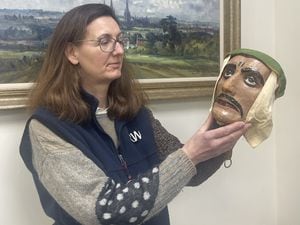Wolves ace Peter Broadbent was player George Best wanted to be
Peter Broadbent was so special he was the player George Best wanted to be.
moreThe Wolves legend, who has today lost a long and cruel battle against Alzheimer's, was a breakthrough artist amid the muck and nettles of the post war English game.
A creative inside forward – a midfielder in modern terms – Broadbent brought to Molineux's legendary team of the late Fifties and early Sixties the flash of style to accompany the fast-raiding wingers.
He was, in short, a player who more than any other drew lavish praise from the great and the good.
Today, across the nation and beyond, there will be a generation of football fans moved to hear of his passing and dabbing a tear from their eye as they recall his footballing splendour.
He recently celebrated his 80th birthday but in truth the curse of dementia, which seems to have taken such an extraordinary toll on his contemporaries, has brought an arduous struggle to Broadbent throughout his later years.
It has also demanded from his widow Shirley a commitment of extraordinary love and devotion as she has tended his care over the years of his declining health.
[video]
Their's was a love story which began around the dance halls and hot spots of Wolverhampton as the 1960s arrived with Broadbent, a sharp-suited, Elvis-quiffed star of a team which regularly jostled for position at the summit of the game in this country.
They became an item and established a love story to endure through the decades.
She never lost her pride in the great player her husband had been and protected his memory and his legacy with huge loyalty.
And rightly so – because there was something about Broadbent that took him above the rest, that made him out of the ordinary.
Mention his name and those who saw him play become misty-eyed at the memories.
A superbly-gifted player, Broadbent could make goals and score them. He had an outrageous body swerve, immaculate ball control and pinpoint passing ability. It says everything about his standing in the game that two more of football's most gifted players, Best and Peter Knowles, were ardent admirers.
Best was a wee lad in Belfast nipping around his neighbours' house – they possessed the only TV in his street – to watch the famous games against crack European opponents when he was left dumbstruck by the flickering images being beamed from a packed and throbbing Molineux.
And his eyes were soon drawn to the player who seemed to be the man controlling the rhythm and the tempo of Wolves' attacking play.
From that moment, Best became a Wolves fan and a particular devotee of Broadbent.
Strangely enough, and a few years later after Best himself had been catapulted to fame, he bumped into Peter and Shirley as they took a break abroad during the close season.
Broadbent found himself more than a little humbled to hear Best tell him he was his hero. It was the start of a friendship that endured throughout the career of one of the greatest players the world of football has produced and the fact that Broadbent was a vital touchstone in Best's story speaks volumes for the impact the Wolves man left behind.
Knowles, too, was another huge admirer and disciple of a footballer he described as like a "ballet dancer on grass."
He treasured each and every moment the pair would share in training as the sorcerer passed on his guidance and tips to a captivated apprentice.
As for the career . . . well, the details are now laminated within the club's Hall of Fame and part of English football folklore.
When Broadbent was signed from Brentford aged 17 in 1951, the £10,000 fee made him the country's most expensive teenager, a clue to accomplished talent Stan Cullis knew he was recruiting.
Broadbent won three First Division championship medals and played in the 1960 FA Cup final win over Blackburn.
He also figured in all four famous friendly wins – over Spartak, Honved, Dynamo and Real Madrid.
He was top scorer in league and cup games in 1958–9 with 22 goals. Broadbent also played in England's first ever under-23 international in 1954 but his debut in a senior international did not come until the 1958 play-off against USSR in the World Cup finals in Sweden.
The great Sir Stanley Matthews once suggested that England should build their team around Broadbent yet he won only seven caps.
But for Wolves fans, even those who saw Billy Wright lead the team to their many glories, there has never been a better pure footballer than Broadbent – and his death closes the book on a story of a player so many will consider the greatest ever to tread Molineux's stage.
Martin Swain





